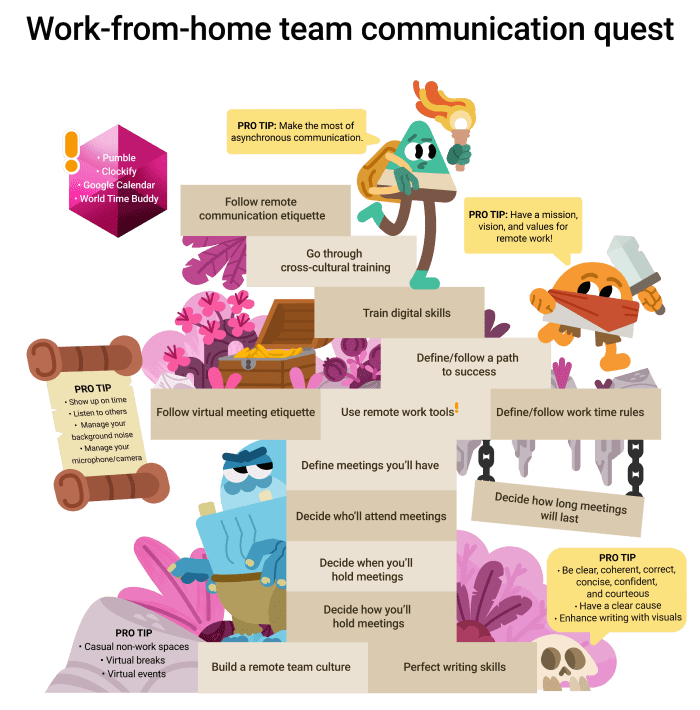Is the traditional facet of learning taking a backseat? Are innovative digital technologies revolutionizing the landscape of education? How are business entities playing their part in this meteoric rise of online education? These questions thrust into prominence the fundamental shift in the sphere of education, reverberating in ever-increasing echoes of digital transformation.
A survey by Statista reveals that online education in the USA was already on a steady growth trajectory, which shot up drastically due to the COVID-19 pandemic. A Pew Research report indicates that there has been a significant increase in the number of students enrolling in fully online courses in recent years. Despite the benefits, online education still confronts a gamut of challenges including inadequate tech infrastructure, lack of personal interaction, and inefficient course designs. To circumvent these pitfalls, software development companies leap to the fore with innovative solutions redefine the contours of online learning experience.
In this article, you will discover how software development businesses are engineering their way towards effectuating an e-learning revolution. From developing user-friendly e-learning platforms, to integrating AI for personalized learning experiences, to providing immersive experiences through AR/VR technologies: These creative ventures are refurbishing the edifice of remote learning in impressive strides.
The later sections of this discourse would delve into the specifics of these technological breakthroughs, what they entail for students and educators alike, and how these solutions intend to shape the future of education in the USA.

Definitions and Meanings Behind Software Development for E-learning
E-learning is a digital approach to education, typically involving courses or lessons being delivered online through varying technology platforms.
Software development refers to the process of creating, designing, programming, testing and maintaining computer software.
When we talk about Software Development for E-Learning, it refers to the process of building digital platforms such as websites, apps, or programs that deliver online education. This involves technologies such as Learning Management Systems (LMS), educational apps, online assessment tools, interactive digital textbooks, and more.
Finally, the Companies mentioned in the topic are businesses that specialize in creating these e-learning platforms, enhancing the accessibility and efficiency of online education.
Empowering Digital Academia: Innovative Software Development Transforming the E-Learning Landscape
Software Development: The New Landscape of E-Learning
Software development has undeniably emerged as the linchpin of the ever-evolving E-Learning landscape, catalyzing innovation and customization in the online education sector. By capitalizing on information technology’s advancements, software developers are creating cutting-edge platforms and tools, directly contributing to the enhancement and diversification of E-Learning. This digital transformation has widened the accessibility and inclusivity of education, thus democratizing learning and ensuring it’s not constrained by geography or a traditional academic calendar.
Dynamic online learning experiences are now possible thanks to the development of interactive, intelligent software solutions. From K-12 to higher education and corporate training, the presence of these IT solutions is prominently visible. They’re drive transforming passive learning into active engagement, thereby promoting robust understanding and knowledge retention. Moreover, software developers are harnessing the power of Artificial Intelligence (AI) and Machine Learning (ML) to create personalized learning experiences, opening the doors to adaptive learning methodologies.
Key Modernizations Fueled by Software Development
- Adaptive Learning Platforms: AI-enabled software can analyze the pattern of learning of individual learners, thereby customizing the course contents and pace of learning accordingly.
- Immersive Learning: Technologies such as VR (Virtual Reality) and AR (Augmented Reality) are being integrated into e-learning software to create immersive and interactive learning experiences.
- Gamification and Interactive Learning: Developers are incorporating dynamic elements such as online quizzes, puzzles, and games to transform the learning experience from monotonous to interactive and fun.
- Mobile Learning: The adaptability of learning through smartphones is catered to by developing responsive software applications, allowing users to learn at their convenience and pace.
Without question, software development and e-learning are interconnected, advancing hand-in-hand. The continuous evolution of technology and education’s intersection is rewriting how knowledge is accessed, consumed, and retained, broadening the horizon for learners across the world. By executing the design and implementation of online education platforms, software development is playing a significant role in the reformation of traditional teaching methodologies and learning frameworks. Hence, the powerful union of software development and e-learning is steering an educational revolution, shifting the paradigm towards accessible, customizable, and dynamic learning experiences for all.
Breaking Barriers with Code: How Companies are Revolutionizing Online Education through Advanced Software Development
A Provocative Query
Is it plausible to consider that the progressive evolution of software development will revolutionize the way we perceive and engage with online education? As we dive deep into the technological realm, software development emerges as a key player in shaping the future of online education. Companies are skillfully exploiting the advancements in software technologies, integrating them into online platforms to deliver superior academic experiences. Sophistication in artificial intelligence, machine learning, and data management systems is proving pivotal. These technologies offer a means to intelligently automate, customize and innovate educational delivery, thereby reducing physical barriers and geographical limitations.
Unresolved Challenges
However, the path to harmony between software technology and online education does face significant roadblocks. One prominent challenge is developing software that genuinely meets the varied needs of a diverse audience, considering the global reach of online education. Pedagogical methodologies, learning objectives, and digital competencies vary across nations and cultures. Hence, creating software that accommodates all these parameters is a daunting task. Additionally, concerns over digital equity persist. While more affluent societies have easy access to technology, this isn’t true universally. Bridging this digital chasm is a significant problem that needs tackling, to truly amplify the potential benefits of software development in online education.
Innovative Success Stories
Despite the aforementioned concerns, several companies spearhead innovations in crafting software to elevate online learning experiences. For instance, Google’s ‘Classroom’ platform offers a diverse range of tools that ease the coordination between teachers and students, making virtual classroom management intuitive and simple. Additionally, platforms such as Coursera offer sophisticated algorithms that personalize learning experiences. Leveraging large amounts of data, Coursera tracks user proficiency and engagement levels, recommending courses and study patterns to enhance individual progress. These examples epitomize the effective deployment of software development for online education and can be further developed to ensure that this medium of education is accessible and beneficial to all.
Bringing the Classroom into the 21st century: The Crucial role of Software Development in Enhancing E-Learning Experiences
The Rising Tide of Digital Transformation in Education
Is the age-old chalk-and-board method of teaching adequate for the fast-paced, digital-centric learners of the 21st century? As we hurdle into the digital future, the influence of software development in revolutionizing the educational landscape cannot be ignored. In today’s globalized world, e-learning has burgeoned as an essential tool, assuming an indispensable role in the dissemination of knowledge. The digital shift, steered by innovative software development, is transforming traditional educational norms, driving an accelerated move away from, what might now be termed, antiquated methods of teaching. The altering processes have their root in cutting-edge technologies like Artificial Intelligence (AI), Machine Learning (ML), and other groundbreaking software integrations. These digital innovations fuel the creation and enhancement of immersive, adaptive, and flexible e-learning platforms that aim for engaging and effective pedagogical experiences.
The Hitches Amid the Digital Revolution
However, the journey to harness technology for optimal educational outcomes is not an easy path. The process of adapting to the new norm of digital learning and tackling the technological shift is fraught with apprehensions. Even as students and teachers embrace e-learning platforms, challenges persist. The struggle to furnish seamless technological accessibility and digital literacy is one of the biggest impediments. Not everyone is afforded easy access to the infrastructure necessary for digital learning, leaving many potential learners on the margins. Further, the dearth of personalized e-learning experiences is a recurring struggle. As e-learning continues to burgeon, the necessity for personalized, engaging, and accessible learning pathways becomes more acute. To overcome these considerable hurdles, commendable steps have been taken by innovative companies pioneering in software development to mold and enhance e-learning.
Innovative Approaches Paving the Way
Several pioneering companies are setting the benchmark in navigating the digital shift efficiently, thereby minimizing the adversities of e-learning. For instance, ‘Moodle’—an open-source learning platform—offers comprehensive, customizable, and secure features, effortlessly enabling learners and educators to create personalized learning environments. Similarly, tech giant Google has augmented online education via ‘Google Classroom’, empowering teachers and students to connect and ignite conversations, manage assignments, and balance their time effectively. Accenture’s ‘Future Talent Platform’ is an excellent example of using gamified and immersive learning to build necessary digital skills. These spectacular initiatives, fueled by innovative software development, are testament to the transformative power and potential of technology to enhance online education. Such innovative practices, if widely adopted and regularly updated, can transform the landscape of e-learning, making it more efficient, accessible, and truly transformative.
Conclusion
How will the technology of online education evolve in the future? This is a compelling question to consider as we conclude our discussion. Software development for e-learning is not static, but it is in a state of constant evolution. Companies dedicated to this cause are contributing to the enhancement of online education by creating innovative, adaptable, and accessible digital platforms. They are constantly pushing the boundaries, developing measures for constructive interaction, and raising the bar for digital learning tools that are engaging and effective. Their contributions are vital in shaping a more inclusive and sustainable future of education.
We hope you’ve found the articles on our blog insightful and informative. It is our absolute pleasure to be your go-to source for the latest developments in e-learning software. We encourage you to continue following our blog and engaging with our content. Your support motivates us to dive deeper, explore further, and produce clearer, more incisive pieces on the exciting world of e-learning software development.
Get ready for a lot of exciting new content to come our way! As the industry progresses, there are bound to be unprecedented innovations and breakthroughs. New layers of interactivity, engagement, and sophistication in e-learning are on the horizon. Our team is committed to keeping you apprised of these revolutionary changes. Stay tuned and be prepared to be blown away by the future of e-learning software. This is just the beginning, and the best is yet to come.
F.A.Q.
1. What does software development for e-learning entail?
Software development for e-learning involves designing and creating applications used to deliver digital education. This includes but is not limited to e-learning platforms, learning management systems, interactive educational games, and mobile education applications.
2. How are companies enhancing online education through software development?
Companies are enhancing online education by deploying innovative software solutions that facilitate interactive learning, progress tracking, and personalized study paths. This also includes solutions for virtual classrooms wherein teachers can provide real-time instruction and feedback.
3. What types of companies are involved in e-learning software development?
Companies involved in e-learning software development range from tech startups to established corporations such as edtech companies, software development firms, and even educational institutions looking to digitize their curriculum. Some companies specialize specifically in e-learning, while others offer it as part of a broader suite of services.
4. Why is software development indispensable for the growth of online education?
Software development is pivotal for online education as it provides essential tools and platforms for digital learning. High-quality software provides flexible, scalable solutions that can meet evolving educational requirements and improve the efficacy and reach of online education.
5. Can custom software be developed for specific educational requirements?
Absolutely. Custom educational software can be designed to cater to particular educational needs and contexts. This might involve developing software for specific educational institutions, for specialized training in corporations, or for particular fields of study.


